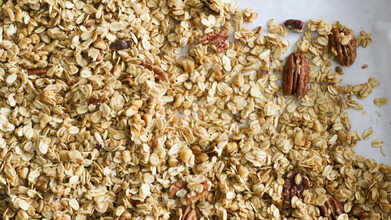- Health Conditions A-Z
- Health & Wellness
- Nutrition
- Fitness
- Health News
- Ayurveda
- Videos
- Medicine A-Z
- Parenting
- Web Stories
Parmesan Cheese, Ice Cream And Lots Of Water: Here's What Taylor Swift's Diet Looks Like

Credit: Canva
I am a Swiftie. While I adore everything about her, there is one particular thing that makes Taylor my superhero—her incredible fitness. She commands the stage for hours at a time. And to be honest, performing three-hour-long concerts requires not just physical stamina but also a well-balanced diet. So What Does Taylor Swift Eat?
No brownie points for guessing that she loves cooking, and breakfast is no exception. According to a popular lifestyle magazine, her collaborator Aaron Dessner shared in December 2023 that she personally prepares meals when hosting guests, proving that she is hands-on in the kitchen.
One of Swift's go-to morning meals is buckwheat crepes with ham, Parmesan cheese, and a fried egg—an antioxidant-rich dish that provides protein and essential nutrients. "It's my go-to breakfast," she had once announced publically. Alongside this, she drinks orange juice daily to support her immune system with a dose of Vitamin C.
Balanced Eating Throughout The Week
Maintaining a balance between healthy eating and occasional indulgences is key to Swift'ss approach to nutrition. During the week, she munches on salads, yoghurt, and sandwiches. Besides, the global popstar also limits sugary drinks with one exception skinny vanilla latte from Starbucks when she needs a treat.
Hydration Is A Priority
Hydration is another priority, with Swift ensuring she drinks plenty of water throughout the day. "I drink so much water my friends call me an alien," she revealed, adding that she even keeps extra bottles in her car for convenience. The daily recommended water intake is about 15.5 cups (3.7 litres) of fluids a day for men, while it is about 11.5 cups (2.7 litres) of fluids a day for women.Indulgence Without Guilt
While Swift maintains a healthy diet during the week, she embraces her favourite comfort foods on the weekends. She loves burgers and fries. When it comes to sweets, she is nearly obsessed with ice creams and loves baking cookies. Rather than restricting herself, she focuses on moderation and enjoying what she loves without guilt. Her weekend routine also includes switching from her usual skinny vanilla latte to a spiced pumpkin latte, embracing seasonal flavours.Taylor Can Feel If She Over-Indulged
"Basically, if I'm indulging too much and not exercising enough, I can feel that," she told an American media outlet. "I can feel a change before I see it. For me, working out is not so I can stay skinny. It’s so that I can keep up my endurance so I'm not panting on stage. Heavy breathing is the worst when you're in concert. You don’t want to see that if you’re going to see a show," she had added.Being A Taylor Swift Fan Is Actually Good For Your Health
Meanwhile, a new study has revealed that Taylor's candidness about her struggles with body image and eating disorders may be helping her fans adopt healthier attitudes toward their own eating habits and body perceptions. The research, conducted by the University of Vermont (UVM), was published in Social Science & Medicine. The researchers concluded that Swift's openness about her body image issues and recovery from eating disorders has a significant and positive influence on her fans.RFK Jr Plans To Issue Dietary Guidance Urging People To Eat More Saturated Fats, But Is It Safe? Here's What Health Experts Say

Credits: Wikimedia Commons, Canva
Robert F Kennedy Jr., the health and human services (HHS) secretary has now planned to issue guidance to encourage Americans to eat more saturated fats. This guidance, if issued, would contradict the decades of dietary recommendations and alarming experts. This has had mixed views from those in the healthcare sector.
Cheryl Anderson, an American Heart Association board member and professor at the University of California, San Diego's school of public health and human longevity science told the Guardian, "My response and sort of counsel to myself was to stay calm, and let’s see what happens, because there was no indication given as to how, why, when this potential shift would occur."
Anderson also added, “The recommendation around saturated fat has been one of the most consistent recommendations since the first edition of the dietary guidelines.”
However, Ronald Krauss, who is a professor of pediatrics and medicine at the University of California, San Francisco has researched saturated fats. He found that saturated fats in fact, could be less harmful than previously thought. To this upcoming planned guidelines, he says, "If [Kennedy} is actually going to go out and say we should be eating more saturated fat, I think that's really the wrong message."
What Does The New Research On Saturated Fats Show?
Krauss's research shows that "saturated fat is relatively neutral" as compared to what scientists had believed earlier. Kennedy too has indicated that in the new guidelines, more stress will be placed to "eat saturated fats of dairy, good meat, of fresh meat and vegetables". The Hill reports that Kennedy said, "When we release those [guidelines], it will give everybody the rationale for driving it into our schools."
As per Krauss's studies, reducing saturated fat intake is only helpful when you replace it with the right things. For instance, replacing saturated fats with unsaturated fats like olive oil and "polyunsaturated fats from other plant sources can really improve metabolic health and reduce heart disease risk, but that’s not saying that saturated fat is necessarily harmful".
His research also focused that replacing saturated fats with sugar and carbohydrates then could increase risk of heart diseases.
Krauss noted that setting strict cutoff points for saturated fat intake, such as the current 10% limit, can often feel arbitrary.
Anderson, however, pointed out that regardless of the exact threshold, data clearly show a pattern: higher saturated fat consumption in a population correlates with increased cholesterol levels and greater cardiovascular disease risk.
While she agrees with Krauss that what replaces saturated fat in the diet is important, Anderson disagrees that saturated fat itself is “neutral.”
“In the current American diet, there’s simply too much saturated fat, and it’s not having a neutral impact on public health,” she said.
Despite differing views, both Anderson and Krauss agree that future nutritional guidelines should focus less on single nutrients like saturated fat and more on overall dietary patterns. Anderson's explanation is that people do not eat nutrients, they eat foods. "When you ask someone what they had to eat, they don't tell you: 'I had fat, or I had carbohydrate, or I had protein."
This is why, as per Anderson, focusing on food is more important and less confusing than focusing on the nutrients.
What Is Colloidal Oatmeal And How Can It Help Manage Eczema?

Credits: Canva
For many people, eczema is more than dry, itchy skin; it’s an ongoing struggle that affects overall well-being, including mood, social life, and sleep. Parents of children with eczema often spend nights trying to stop persistent scratching, while adults frequently feel self-conscious at work or in public when flare-ups are visible.
The condition also brings financial strain from treatments, frequent doctor visits, and emotional stress. In India, eczema is worsened by the climate, pollution, and regular use of harsh or fragranced skincare products, making sensitive skin even more prone to irritation. Gentle, science-backed care is essential, not just helpful, to manage skin conditions that affect over 30–40% of Indians.
We spoke to Dr Preethi Nagaraj, Medical Director and Senior Dermatologist at Twacha Skin and Hair Clinic, Kochi, to learn more.
What Is Eczema and Its Ripple Effects?
Eczema, or atopic dermatitis, typically appears as dry, itchy, and red patches on the skin. While some people may experience mild irritation, others face severe flare-ups that disrupt daily life. But eczema is more than a skin condition, it can affect concentration, mental health, and sleep. Dr Nagaraj explained that this can make it harder for children to focus at school and cause adults to miss work or social events. Recognizing these broader effects shifts the focus from simply treating the skin to supporting the individual as a whole.
Why the Skin Barrier Matters
The main reason eczema develops is a compromised skin barrier. A healthy barrier relies on ceramides, fatty acids, and cholesterol to retain moisture and block irritants. When ceramides are low, skin loses water quickly and becomes highly sensitive, even with regular moisturization. Genetics also play a role—about one-third of Indian children with hand eczema have filaggrin mutations, weakening their protective layer. That’s why consistent, barrier-focused skincare is essential to keep flare-ups under control.
What Is Colloidal Oatmeal?
Colloidal oatmeal is a fine powder made from whole oat kernels and is used as a skin protectant to soothe itching and irritation. It’s a recognized ingredient that hydrates skin, protects against irritants, and provides antioxidant and anti-inflammatory benefits. It can be used in bathwater or in creams and lotions, according to Healthline.
How Can Colloidal Oatmeal Help Treating Eczema
Colloidal oatmeal isn’t just a breakfast ingredient, it’s been a long-standing skin soother. It contains compounds called avenanthramides that calm inflammation and reduce itchiness. Beta-glucans form a protective layer to lock in moisture, and oat lipids help repair the skin’s barrier. Research supports these benefits: a study of over 54,000 patients found that not using oatmeal-based emollients increased the likelihood of being prescribed steroid creams by more than 21%. Another analysis showed that infants who regularly used oatmeal-based products were less likely to develop eczema. Gentle, effective, science-backed oats remain a staple for sensitive skin care.
Ceramides: Repairing What Eczema Steals
Dr Nagaraj explained that ceramides are natural skin fats that hold cells together and maintain hydration. Low ceramide levels make eczema-prone skin prone to cracking, roughness, and sensitivity to triggers. The good news? Oat oil can boost ceramide production in the skin by up to 70%. Combining ceramides with colloidal oatmeal in a moisturizer creates a powerful duo: one soothes and hydrates, while the other strengthens the skin’s protective layer.
Making Science-Backed Skincare Work Every Day
For sensitive or eczema-prone skin, Indian dermatologists often recommend gentle, fragrance-free products enriched with colloidal oatmeal. Using these regularly is preventive, not a luxury. Consistent care can mean fewer sleepless nights for families, while adults regain confidence at work and in social settings. The key to preventing flare-ups is a steady, regular routine.
Eczema can take a physical and mental toll, but it doesn’t have to control life. Colloidal oatmeal, supported by tradition and science, provides gentle, effective relief, while ceramides maintain the skin’s strength. Together, they reduce sensitivity to daily triggers and help break the cycle of flare-ups. The takeaway is simple: small, consistent steps in skincare can have a major impact. With the right approach, patients and families can reclaim comfort, confidence, and quality of life, making colloidal oatmeal a trusted ally on the path to healthier skin.
Is Bubble Tea Putting Your Health at Risk? Experts Warn About Lead Exposure

Credits: Canva
A trendy drink that’s become a social media favorite may now have fans thinking twice, after questions were raised about one key ingredient.
Bubble tea, also called boba or pearl milk tea, first appeared in Taiwan in the 1980s. It’s usually made with tea, milk or creamer, a sweetener, and, of course, the signature chewy tapioca pearls.
While its colorful, Instagram-worthy appeal has made it popular around the world, recent safety tests from Consumer Reports suggest there could be reason for concern.
Also Read: mRNA COVID Vaccines Found To Help Cancer Patients Live Longer: Can This Be The Ultimate Cancer Cure?
Boba Tea Contains Lead?
Bubble tea, the Taiwanese drink made of black tea, milk, sugar, and chewy tapioca pearls, has won fans worldwide since its debut in the 1980s. But recent findings suggest it may deserve a closer look.
A Consumer Reports investigation in the US found high lead levels in some bubble tea products, echoing earlier concerns about cassava-based foods. The tapioca pearls, the drink’s signature “bubbles,” are made from cassava starch, which can absorb lead and other heavy metals from the soil as the plant grows.
Why Are Tapioca Pearls Harmful?
Lead is naturally present in the Earth’s crust, and much of the world’s soil contains significant contamination. Many fruits and vegetables, including cassava, can absorb heavy metals during growth.
Consumer Reports tested tapioca pearls from popular bubble tea chains, Gong Cha and Kung Fu Tea, as well as packaged boba products from Trader Joe’s and WuFuYuan. Every sample contained some lead. Thankfully, none exceeded the levels that Consumer Reports considers concerning, and none had dangerous levels of arsenic, cadmium, or mercury in a single serving.
Also Read: World Polio Day: How the Polio Vaccine Became a Lifesaving Shield Against a Global Disease
“These levels weren’t high enough for us to advise people to completely avoid bubble tea,” said James E. Rogers, PhD, director of food safety research and testing at Consumer Reports.
“However, this wasn’t a comprehensive survey of the boba and bubble tea market. The fact that three out of four samples contained more than half of our level of concern for lead in a single serving is a strong reminder that bubble tea should be enjoyed occasionally, rather than as an everyday drink.”
Beyond heavy metals, the starchy composition of tapioca pearls can pose other risks. Eating large amounts may slow stomach emptying, a condition called gastroparesis, or even cause blockages. Symptoms can include nausea, vomiting, and abdominal pain, and people with already slow digestion may be particularly affected.
Bubble Tea and Kidney Health
Bubble tea can also impact kidney health. In 2023, Taiwanese doctors removed more than 300 kidney stones from a 20-year-old woman who reportedly drank bubble tea in place of water. Ingredients such as oxalate and high phosphate levels can contribute to stone formation, though this extreme case likely reflects unusually high consumption.
Jason Tsou, General Manager at WuFuYuan’s parent company, Shanghai ZhouShi Foodstuffs, said the company routinely tests its products for lead through an accredited laboratory. Following these recent findings, they have introduced stricter standards to ensure safety, as per New York Post.
© 2024 Bennett, Coleman & Company Limited

